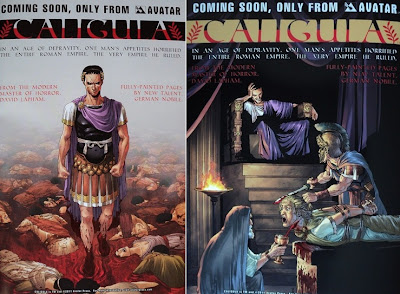 Lack of information or preconceived ideas can invalidate the work of any historian; I guess that’s why 90% of history books I’ve enjoyed the most have been written by people who were actually "there". It's such an inspiration to read the works of Herodotus or Caius Sallustius Crispus because they wrote about their lives, about an era in which they lived in; despite the lack of methodology in their works I trust them. Those ‘prehistoric’ historians have turned me into a huge fan of Ancient Greece and the Roman Empire. Suetonius, however, has always been one of my favorites, his "Twelve Caesars" is astonishing.
Lack of information or preconceived ideas can invalidate the work of any historian; I guess that’s why 90% of history books I’ve enjoyed the most have been written by people who were actually "there". It's such an inspiration to read the works of Herodotus or Caius Sallustius Crispus because they wrote about their lives, about an era in which they lived in; despite the lack of methodology in their works I trust them. Those ‘prehistoric’ historians have turned me into a huge fan of Ancient Greece and the Roman Empire. Suetonius, however, has always been one of my favorites, his "Twelve Caesars" is astonishing. David Lapham, however, is a writer that does not pretend to be a historian. He adds something new to the traditional chronicles. Lapham takes Caligula's basic instincts, what many would have called, now and then, depravity, moral corruption and perversion, into something which is far more accessible to today's reader: Horror.
When Caligula brutally rapes and murders the mother of a young man, the now orphan swears to seek revenge on the emperor. However, to carry out his solemn vows, he must first pierce into the ever elusive and exclusive circle of the Caesar. In the first issue this boy must learn how to negotiate with others in order to gain something, even if that means surrender his own body to the appetites of others. Although, what’s more interesting, is that the true horror lies within the halls of marble, and as the protagonist lays eyes onto a most savage orgy, he feels as if he has descended into the depths of depravity. David Lapham and German Nobile manage to impress the audience with each page.
_________________________________________________________________
La falta de información o los prejuicios pueden invalidar la obra de cualquier historiador. Supongo que por eso, el 90% de los libros de historia que leo son escritos por hombres de su tiempo. Es realmente inspirador leer las obras de Herodoto o Cayo Salustio Crispo; ellos escribían sobre sus vidas, sobre la época en la que vivían, y aunque no haya una metodología en sus trabajos, es gracias a ellos que soy un fanático de la Antigua Grecia y del Imperio Romano. Suetonio, sin embargo, sigue siendo uno de mis favoritos.
David Lapham es un escritor que no pretende ser historiador. Añade algo nuevo a las crónicas tradicionales. Lapham convierte los instintos básicos de Calígula, aquello que ahora podríamos llamar depravación, corrupción moral y perversión, en algo mucho más accesible para el lector contemporáneo: el terror.
Cuando Calígula viola y asesina brutalmente a la madre de un joven romano, el huérfano buscará vengarse del emperador. No obstante, para cumplir con su solemne juramento primero debe penetrar en el elusivo y exclusivo círculo del césar. En este primer episodio, este joven deberá aprender a negociar con la gente para obtener algo a cambio, incluso si eso significa comerciar con su propio cuerpo para saciar los apetitos de otros. Sin embargo, lo más interesante es observar que el horror se encuentra al interior de los salones de mármol; allí, el protagonista sentirá que ha descendido a los abismos de la depravación. David Lapham y German Nobile se las arreglan para impresionar al lector en cada página.



